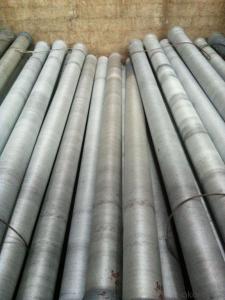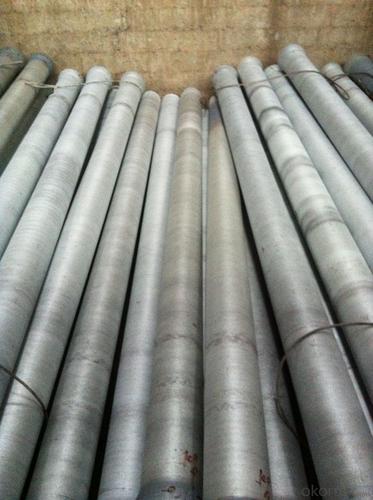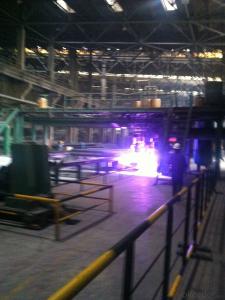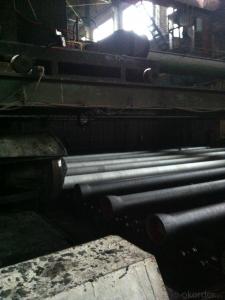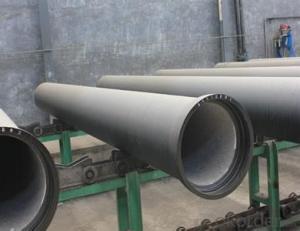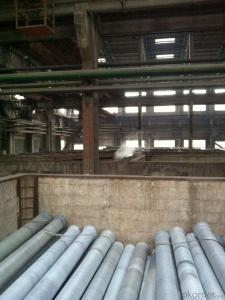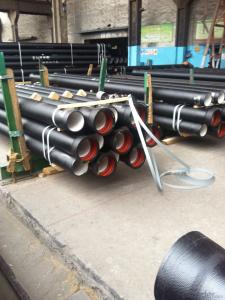DUCTILE IRON PIPE AND PIPE FITTINGS K7 CLASS DN900
- Loading Port:
- Tianjin
- Payment Terms:
- TT OR LC
- Min Order Qty:
- 32 pc
- Supply Capability:
- 3000 pc/month
OKorder Service Pledge
OKorder Financial Service
You Might Also Like
· Material : Ductile Cast Iron
· Size Range : DN 80mm to DN 2000mm
· Unit Effective Length : 6m or 5.7m
· Manufacture Standard: ISO 2531:1998/ EN 545:2006/EN 598:2007
· Annual capacity : 200,000 tons
· Coating Exterior: Zinc 130g/m2 according to ISO 8179-1 and bitumen coating 70 microns.
· Cement Interior: Portland Cement/ High Alumina Cement/ Sulphate Resisting Cement Lining according to ISO 4179
· Special requirements on external coating and internal lining can be applied
· We also provide accessories such as SBR/EPDM rubber gaskets, lubricant paste, pipe caps, PE sleeves, etc.
Additional Parts:
Each pipe is strictly inspected according to related standard to ensure permanently high performance.
Easy Installation at site and service free for life
Long Service Lifespan
Quotation will arrive you within 24hours once we get your inquiry.
We guarantee offering you a competitive price.
A copy of original inspection reports of pipes will be offered after shipment.
Photos of loading process will be sent to the customer after shipment effect.
We will follow-up the delivery progress after shipment effect and update to the customer on weekly basis.
- Q: What is the relationship between continuous cast iron pipe and ductile iron pipe?
- In general, the continuous cast iron pipe is the continuous casting of gray cast iron pipe, while the centrifugal cast iron pipe is centrifugal ductile iron pipe. Of course, you have to be hard, just to make continuous ductile iron pipes, that's what you want.
- Q: Can ductile iron pipe be used for industrial wastewater applications?
- Yes, ductile iron pipe can be used for industrial wastewater applications. Ductile iron pipe is known for its strength, durability, and resistance to corrosion, making it suitable for various applications including wastewater systems. It can handle high-pressure and heavy-duty environments, making it ideal for industrial wastewater applications that may involve abrasive or corrosive substances. Additionally, ductile iron pipe can be easily installed and maintained, reducing the overall costs and ensuring long-term reliability. However, it is important to consider the specific requirements of the wastewater application and consult with professionals to determine the most suitable pipe material and design.
- Q: Can ductile iron pipes be installed outdoors?
- Ductile iron pipe is a kind of cast iron. It is an alloy of iron, carbon and silicon.
- Q: How long does the cast iron pipe of indoor direct buried sewage need to be examined?
- Indoor drainage of the majority of households are using cast iron pipe, if the distance from the sewage well is relatively close, and the above does not take the car, you can consider the U-PVC.
- Q: What's the function of the cement mortar lining of ductile iron pipes?
- Active protection is superior to barrier coating, cement mortar lining, and a stable hydroxide film formed on the surface of ductile iron and steel pipe to form a protective layer. This kind of protective coating has excellent antiseptic properties because they spontaneously protect themselves even in discontinuous linings. A polymer in sharp contrast, such as an epoxy lining, is also barrier coating, but only if 100% is applied without leakage. Any interruption or leakage will cause corrosion.It has been documented that cement mortar and cement mortar have been applied to the field of water transportation and can meet the water quality standards for a long time. Some standards still apply to the world. Cement mortar does not support microbial growth. In the case of corrosive water or low flow rate (prolonged stagnation), it is better to use cement mortar lined pipes because it can maintain high pH values in the pipe. This does not cause health problems and can be prevented by very simple sealed coating methods. The natural characteristics of the sealing coating provide the best protection for the inner wall of the pipe, while ensuring that all the water quality indexes meet the quality requirements, low cost and high efficiency.
- Q: Can ductile iron pipe be used for road and highway crossings?
- Yes, ductile iron pipe can be used for road and highway crossings. Ductile iron pipes are known for their high strength, durability, and flexibility, making them suitable for various applications, including road and highway crossings. They can withstand heavy loads and provide excellent resistance to external forces, making them a reliable choice for underground installations in transportation infrastructure.
- Q: Are ductile iron pipes suitable for wastewater pumping stations?
- Yes, ductile iron pipes are suitable for wastewater pumping stations. Ductile iron is a strong and durable material that can withstand the harsh and corrosive nature of wastewater. It has excellent resistance to abrasion, corrosion, and impact, making it a reliable choice for wastewater applications. Additionally, ductile iron pipes have a high tensile strength and can handle high-pressure situations, making them suitable for pumping stations where wastewater needs to be transported over long distances or through elevated areas. The smooth interior surface of ductile iron pipes also helps to minimize friction and enhance the flow of wastewater, reducing the risk of clogging or blockages. Overall, ductile iron pipes provide a cost-effective and long-lasting solution for wastewater pumping stations.
- Q: How are ductile iron pipes protected during transportation and storage?
- Ductile iron pipes are typically protected during transportation and storage through various methods. One common practice is to apply a coating of bituminous paint or epoxy on the exterior surface of the pipes to prevent corrosion. Additionally, the pipes are often wrapped with plastic or other protective material to shield them from physical damage and moisture. Proper handling and stacking techniques are also employed to minimize the risk of any deformation or cracking during transportation and storage.
- Q: Will the quality of ductile iron shrink?
- This is a ductile iron is prone to problems, manhole covers, large flat pieces, you have to see clearly, and some appear to be concave, not shrink, it may be caused by large gas emissions, not out
- Q: Can ductile iron pipes be used in coastal or marine environments?
- Yes, ductile iron pipes can be used in coastal or marine environments. Ductile iron is a type of cast iron that has been treated with magnesium to give it enhanced strength, ductility, and resistance to corrosion. This makes it suitable for use in environments with high levels of moisture, such as coastal or marine areas. Coastal and marine environments are known for their high levels of saltwater, which can cause corrosion in metal pipes. However, ductile iron pipes have excellent corrosion resistance due to their protective coating. This coating acts as a barrier between the pipe and the corrosive elements present in saltwater, preventing the formation of rust and extending the lifespan of the pipes. Furthermore, ductile iron pipes can withstand the high pressures and stresses associated with coastal and marine applications. They have a high tensile strength, allowing them to handle the weight of soil, rocks, and other materials that may be present in these environments. Additionally, ductile iron pipes are resistant to damage from external forces, such as waves or debris, making them a reliable choice for coastal or marine projects. In summary, ductile iron pipes are a suitable choice for coastal or marine environments due to their corrosion resistance, high tensile strength, and durability. They can reliably transport water or other fluids in these challenging environments while maintaining their structural integrity over an extended period of time.
Send your message to us
DUCTILE IRON PIPE AND PIPE FITTINGS K7 CLASS DN900
- Loading Port:
- Tianjin
- Payment Terms:
- TT OR LC
- Min Order Qty:
- 32 pc
- Supply Capability:
- 3000 pc/month
OKorder Service Pledge
OKorder Financial Service
Similar products
Hot products
Hot Searches
Related keywords
